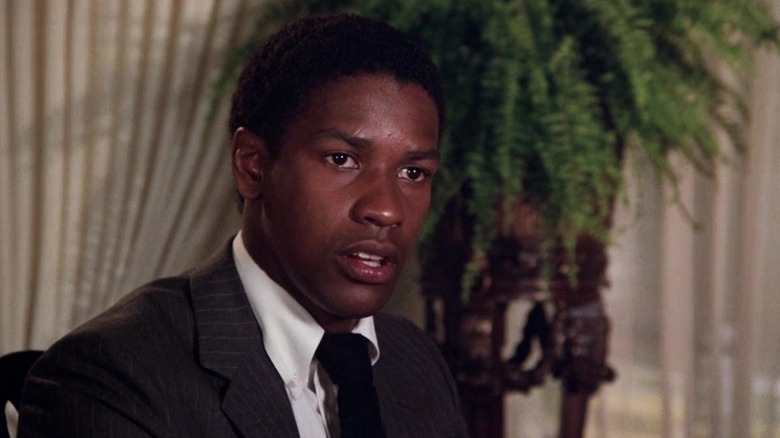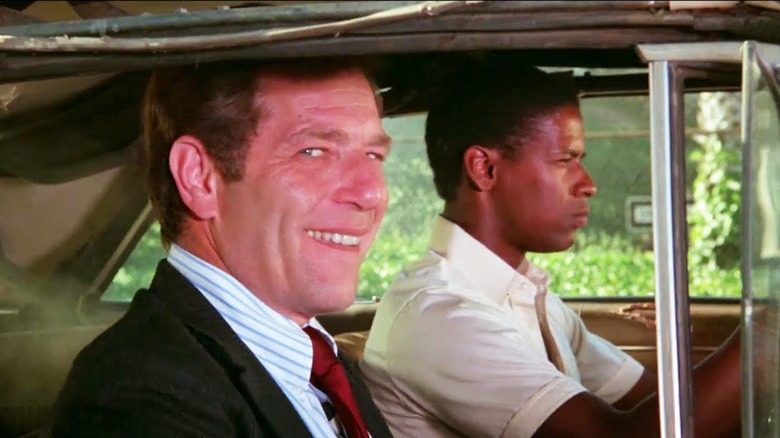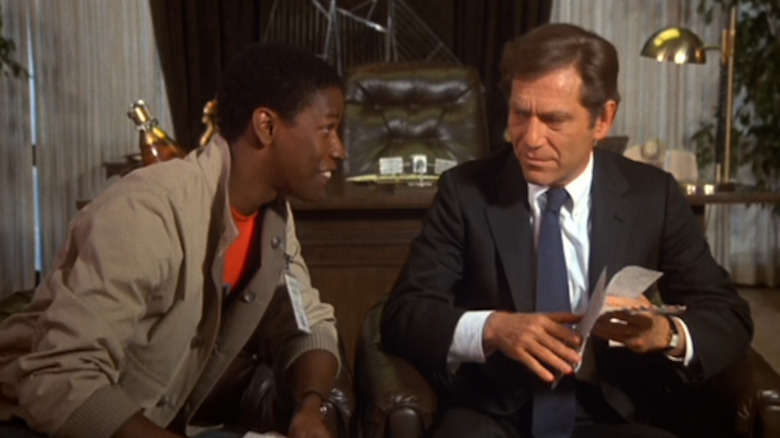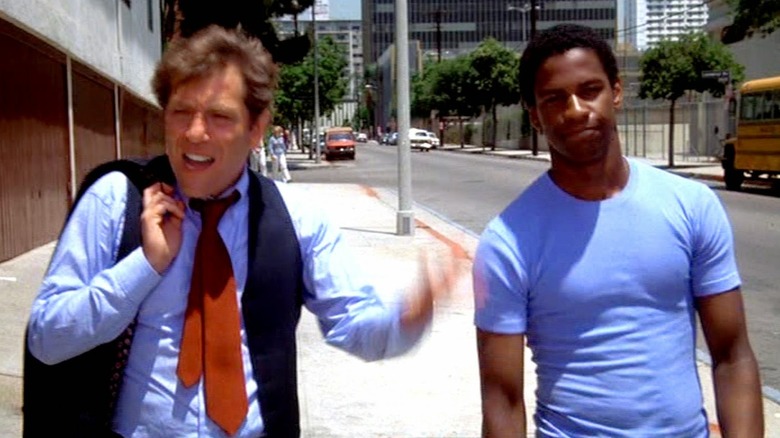Denzel Washington's Worst Movie Is Also His First Movie
99.9% of working actors are forever in search of that fabled "big break" which will never, ever come. For many, the quest starts in school and regional theater, where they outshine everyone; they're so good, directors are sometimes forced to cast them well outside of their age range because their brilliance in a minor role will throw the entire show off balance. Then they head off to college, where they typically find they're not the Olivier or Streep. After that, it's New York City or Hollywood, and either a trip back to graduate school so they can potentially make a living as a teacher or a resigned segue into another career.
In 1981, this was the struggle if you were white. If you were an aspiring African-American actor, you were playing a completely different game. Most stars of color were musicians or comedians — and male. If you were a character actor, the roles tended towards servants, criminals, athletes, and wise old folk. Romantic leads were incredibly hard to come by, and generally lacked for sex appeal — because had African-American performers been afforded the same opportunities as whites, Billy Dee Williams and Lonette McKee would've been two of the biggest stars of the 1970s.
So the dice were loaded when 26-year-old Denzel Washington took his roll at the crapshoot that is a professional acting career. And even if those cubes turned up favorably, there was no guarantee the part would be worthy of his talent.
This is what's so frustrating about "Carbon Copy." On the surface, given the talent involved, it was a project with reasonable potential. But it's so cloddishly executed, deeply unfunny and, in one instance, astonishingly insensitive that all Washington's presence can do is put the filmmakers to shame.
A promising concept ineptly executed
Washington had just earned his first bit of acclaim in the television movie "Wilma" (a biopic about Olympic sprinter Wilma Rudolph starring Shirley Jo Finney and Cicely Tyson) when he landed the co-lead in Michael Schultz's "Carbon Copy." Written by Stanley Shapiro (and based on his play "The Engagement Baby"), the film sought to operate on two levels: a fish-out-of-water comedy and a high-society farce. The movie sets itself an interesting challenge early by tipping its hand and revealing that Washington's teenaged Roger Porter is the biological son of George Segal's wealthy executive Walter Whitney. There's a hint of sentiment here because it's obvious Walter truly loved Roger's mother (indeed, Schultz was himself the product of mixed parentage), but this tenderness vanishes when Roger comes on suspiciously strong. He wants to live with Walter.
This is a huge problem for Walter, who's already suffering through a loveless/sexless marriage with Susan Saint James' heiress Vivian, which has him skating on the thinnest of ice with her father (and his boss) Nelson (a strangely subdued Jack Warden). Realizing the young man won't relent (and feeling some patriarchal obligation), he sells the concept of Roger living with him to Vivian as a social project that might impress their neighbors. But after a disastrous first dinner, everything goes south for Walter. He loses his job, his Rolls Royce, gets kicked out of the house and winds up living in a "furnished" Watts apartment where he finds work cleaning horse stables.
Ultimately (and quite conveniently), Vivian and Nelson have a change of heart; they ask him to come back home. After going to jail for a wrongly accused Roger, Walter seems absolved of his obligation to Roger. This is when Roger drops his ruse and speaks plainly to his father for the first time since meeting him.
Denzel still finds a way to shine
In a more deftly written and directed film, the jail visitation where Roger explains why he clung so hard to Walter could've packed a melancholy punch. Shapiro's script sets us up to expect Roger to give Walter a "You're alright, Mr. Charlie" (that's been his nickname for Walter since they met) nod of approval, but he comes at him straight. Schultz mostly holds the camera on Washington and lets him low-key vent. As he tells Walter:
"I didn't want anything from you, Mr. Charlie. No adoption. No trust fund. Nothing. I just came out here because every kid wants to see what his dad is like. I didn't want you to like me because I was your son. I wanted you to respect me because I was mom's son. When I looked in your eyes, you didn't see mom. You saw black. And mom deserved better than that. You owed her more than that."
Walter knows this is true, and, when asked, acknowledges to Roger that he loved his mother very much. He walked away from a great woman for a highly compromised good life (he's been hiding his Jewish heritage from his colleagues since moving to California).
If I've made "Carbon Copy" sound like a worthwhile movie, blame Washington. He's just so terrific in that jail scene (The New York Times' Janet Maslin inexplicably found his performance disappointing) that you can see the potential here for either an earnestly wistful comedy (especially after we learn Roger's in pre-med at Northwestern on a full scholarship) or a barbed satire in the vein of Paul Mazursky's "Down and Out in Beverly Hills."
A consequence-free bomb for Denzel
But this is an unforgivably wretched film from the outset. It kicks off with Walter trying to force Vivian into a bit of morning sex — a cliched comedic bit of business that sets itself apart by turning the situation into a full-blown attempted rape. Think that's rancid? Wait until Schultz and Shapiro pay off that gag by having Vivian catch a masked Walter trying to steal money from their bedroom safe, at which point she goads him into raping her (Schultz cuts away the second Walter rips the sheet off the bed).
That the rich are different and more depraved than you and me is hardly a revelation. But if you're going to attempt this high of a bar for a belly laugh, maybe do it in a movie that isn't also trying to be a good-hearted lamentation about American society's disapproval of racially mixed families.
"Carbon Copy" was a box office failure, but only Segal and Schultz (who was just a few years removed from the debacle of "Sgt. Pepper's Lonely Hearts Club Band") got hurt. Two months after "Carbon Copy" tanked, Washington took the stage in the Off-Broadway smash "A Soldier's Play." Three years later, he co-starred in the critically praised film adaptation.
Washington wasn't flying blind. He knew coming out of "Carbon Copy" that he had to be pickier going forward. As he told Entertainment Weekly:
"Sidney Poitier told me the first three or four films you make will determine how you're perceived in this business. Later on, I was offered another comedy, but it wasn't funny to me — I thought it was quite racist. I didn't take it, and I waited about six months and I got 'Cry Freedom' [the 1987 biopic of South African activist Stephen Biko, for which Washington earned his first Oscar nomination]. That movie changed everything. I could have taken that bad comedy and had a totally different career."
He did make what's probably his second worst movie in 1990 with "Heart Condition" (how do you mess up a buddy comedy starring Washington and Bob Hoskins?), and he's had his share of slip-ups since. But he's never been associated with anything as wrongheaded as "Carbon Copy" — and this is partially because the possibilities open to an African-American actor of his rare talent expanded tremendously over the next several decades (though we still need to work on the volume of those opportunities).



